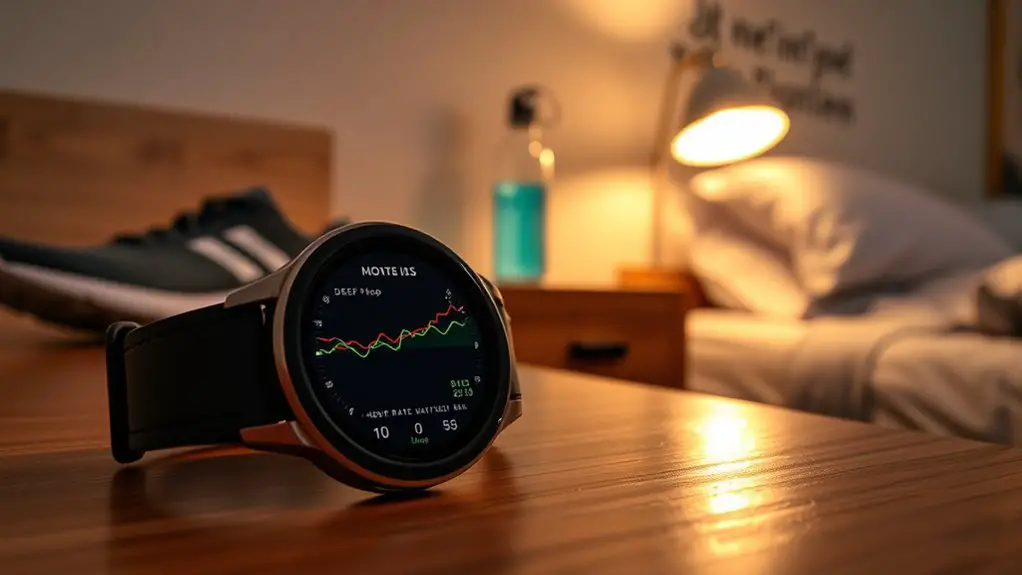Sleep tracking offers you valuable insights into your sleep patterns, helping you understand how rest impacts your performance. By monitoring sleep stages, quality, and duration, you can make informed choices about training and recovery. This technology aids in enhancing your focus, mental clarity, and reaction times, while also preventing fatigue and injuries. You can even tailor your sleep strategies to fit your unique needs. Discover how optimizing your rest can elevate your athletic game even further.
Understanding Sleep and Athletic Performance
When you consider the demands of athletic performance, it's clear that sleep plays a crucial role. You need those precious hours of rest to recover, rejuvenate, and restore your body and mind. Quality sleep boosts your reaction times, sharpens focus, and enhances endurance. It's not just about clocking in the hours; it's about how restorative that sleep is. When you're well-rested, you're more likely to push your limits and reach new heights in your sport. Ignoring sleep can lead to fatigue, decreased motivation, and even injury. By prioritizing sleep, you're giving yourself the freedom to perform at your best, release your potential, and truly enjoy the thrill of competition. Embrace the power of sleep; it's a game changer.
The Science Behind Sleep Tracking
Understanding how sleep tracking works can greatly enhance an athlete's performance. Sleep tracking technology uses sensors to monitor your sleep stages, heart rate, and even movement. By collecting this data, you can gain insights into your sleep quality and duration. This knowledge empowers you to make informed decisions about your training and recovery. For instance, if you notice you're consistently waking up during the night, you might adjust your bedtime routine or environment to promote deeper sleep. Sleep tracking also helps you align your training schedules with ideal rest periods, allowing your body to recover better. Ultimately, harnessing this science gives you the freedom to optimize your physical potential and maintain peak performance.
Identifying Sleep Patterns and Trends
Analyzing your sleep data can reveal significant patterns and trends that directly impact your athletic performance. By tracking your sleep duration and quality, you can identify what works best for you. Maybe you notice that those late-night training sessions lead to poorer sleep, or perhaps you find that a consistent bedtime boosts your energy levels. Recognizing these patterns helps you make informed choices, giving you the freedom to optimize your schedule. Additionally, you can see how factors like stress or diet affect your sleep. Each insight empowers you to take control of your rest, allowing you to enhance your performance and enjoy your sport even more. Embrace this journey of self-discovery and reveal your true potential.
Enhancing Recovery Through Better Sleep
While you push your limits during training, prioritizing quality sleep can greatly enhance your recovery. Better sleep means your body can repair itself, allowing you to perform at your best. Here are four ways improved sleep boosts recovery:
- Muscle Repair: During deep sleep, your body releases growth hormones, essential for muscle recovery.
- Reduced Inflammation: Quality sleep helps lower cortisol levels, reducing inflammation and speeding up recovery.
- Pain Management: Good sleep can improve your pain threshold, making it easier to handle post-workout soreness.
- Immune Function: Adequate sleep strengthens your immune system, helping you fend off illness and maintain training momentum.
Improving Focus and Mental Clarity
Since quality sleep is essential for athletes, it directly impacts your focus and mental clarity during training and competition. When you track your sleep, you can identify patterns that either enhance or hinder your cognitive performance. A well-rested mind sharpens your decision-making skills, boosts your reaction times, and elevates your overall game. You'll experience less brain fog and greater motivation, allowing you to fully embrace each training session and competition. By prioritizing sleep and understanding its effects, you can release your true potential. The freedom to perform at your best comes from being mentally sharp and alert. Embrace sleep tracking, and watch as your focus and clarity transform your athletic experience. It's a game-changer you won't want to overlook.
Preventing Injuries With Optimal Rest
Sleep plays an essential role not only in sharpening your focus but also in reducing the risk of injuries. When you give your body the rest it craves, you enhance recovery and performance. Here are four key ways ideal rest helps prevent injuries:Sleep is vital for focus and injury prevention, enhancing recovery and performance for athletes.
- Muscle Repair: Sleep promotes the release of growth hormones, aiding muscle recovery.
- Coordination: Well-rested athletes maintain better coordination and balance, reducing fall risks.
- Mental Sharpness: Sleep enhances decision-making, helping you avoid risky moves during training or competition.
- Immune Function: Quality sleep strengthens your immune system, lowering the chances of illness that could sideline you.
Prioritizing rest isn't just about feeling good; it's about staying in the game and thriving in your sport.
Tailoring Sleep Strategies to Individual Needs
Understanding that each athlete has unique needs is essential for optimizing sleep strategies. You'll want to take into account factors like your training schedule, personal preferences, and lifestyle. Maybe you thrive on a longer sleep duration or feel refreshed with a power nap. Listen to your body; it knows what's best for you.
Experiment with different sleep environments, like temperature and lighting, to find what helps you unwind. You might also explore varying your bedtime based on upcoming competitions or workouts. By tracking your sleep patterns, you can identify what truly enhances your performance. Remember, it's about creating a sleep routine that feels right for you, giving you the freedom to excel in your sport while maintaining balance in your life.
Sleep Tracking Tools and Technologies
As you look to enhance your athletic performance, utilizing sleep tracking tools and technologies can provide invaluable insights into your rest patterns. These tools help you understand how well you're recovering, allowing you to make informed adjustments. Here are four popular options to evaluate:
- Wearable Devices: Smartwatches and fitness bands track your sleep cycles and heart rate.
- Sleep Apps: Mobile apps can monitor your sleep duration and quality, offering personalized tips.
- Smart Mattresses: These can adjust firmness and temperature based on your sleep needs.
- Sleep Trackers: Standalone devices placed under your pillow or mattress to provide detailed sleep analytics.
Real-Life Success Stories of Athletes Using Sleep Tracking
Many elite athletes have turned to sleep tracking to gain a competitive edge, and their success stories highlight its transformative impact. For instance, a professional cyclist improved his performance by optimizing his sleep schedule, while a marathon runner found that quality sleep reduced injuries. These athletes embrace the freedom that comes with data-driven insights, allowing them to push their limits effectively.
Here's a glimpse of their experiences:
| Athlete | Sport | Improvement Achieved |
|---|---|---|
| Professional Cyclist | Cycling | Enhanced endurance |
| Marathon Runner | Running | Fewer injuries |
| NBA Player | Basketball | Better focus during games |
| Triathlete | Triathlon | Increased recovery rate |
These stories illustrate how sleep tracking can revolutionize an athlete's journey to success.
Frequently Asked Questions
How Does Sleep Tracking Affect an Athlete's Overall Well-Being?
Sleep tracking can boost your overall well-being by helping you understand your sleep patterns. When you know how well you're resting, you can make adjustments that enhance energy, recovery, and performance in all areas of life.
Can Sleep Tracking Improve Team Performance in Sports?
Imagine a well-oiled machine—sleep tracking's like fine-tuning that engine. By monitoring rest patterns, you can enhance overall team performance, improve focus, and foster better communication, ultimately leading to greater success on the field together.
What Are the Long-Term Effects of Poor Sleep on Athletes?
Poor sleep can lead to decreased focus, slower reaction times, and increased injury risk for you as an athlete. Over time, it may hurt your performance, overall health, and mental well-being, limiting your potential.
Are There Specific Sleep Requirements for Different Sports?
Imagine a finely tuned machine, each sport needing its own rhythm. You'll find that endurance athletes often crave more sleep, while power athletes thrive on shorter, intense rest. Tailoring your sleep can reveal your true potential.
How Can Coaches Support Athletes in Their Sleep Tracking Efforts?
To support your sleep tracking, coaches can encourage open discussions about sleep habits, provide resources like apps or wearables, and create a culture that values rest. You deserve the freedom to prioritize your recovery and performance.




